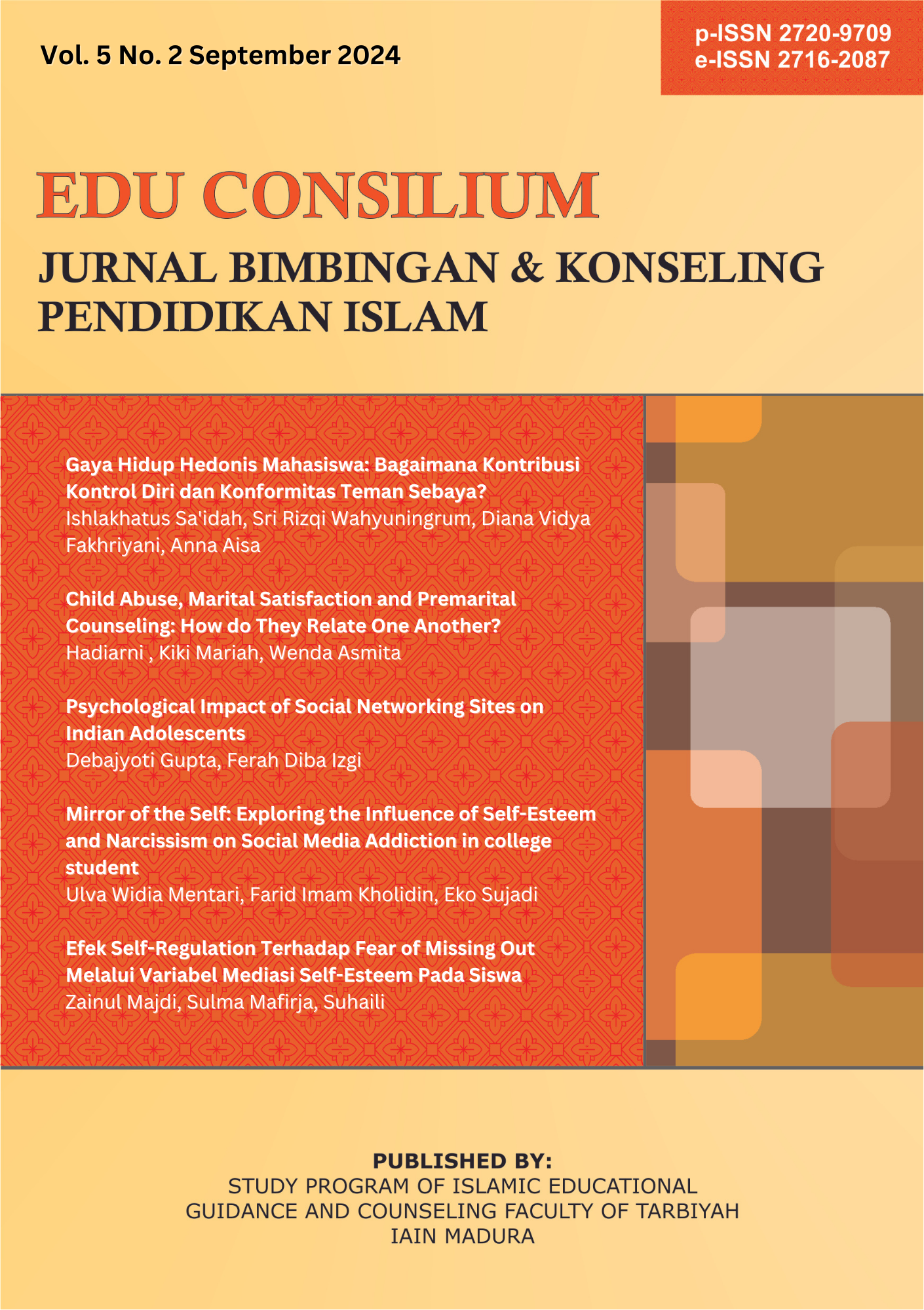Dinamika Kesejahteraan Psikologis Remaja di Jawa Timur
 Abstract views: 345
,
Abstract views: 345
,
 PDF downloads: 457
PDF downloads: 457
Abstract
Adolescents' psychological well-being is influenced by several factors, namely age, gender and parents' work. The aim of this research was to determine the dynamics of adolescent psychological well-being in East Java. This research is a quantitative descriptive study. Data collection was carried out through a survey using a research instrument in the form of a scale of adolescent psychological well-being which was distributed via Google Form. The population studied were teenagers aged 12-18 years who were currently attending junior high and high school in East Java. The sample was chosen randomly using a random sampling technique, with a total of 413 respondents. The results of this research show that the psychological well-being of teenagers in East Java in the 12-18 year age range is generally quite good, even in the high category. There is no significant difference in psychological well-being between male and female adolescents.In general, psychological well-being also tends to be high in various age ranges, with the peak occurring at age 17 years. In the context of socio-economic factors, the psychological well-being of adolescents is also relatively high, although adolescents with socio-economic backgrounds whose parents earn below the Minimum Wage (UMR) have a higher level of psychological well-being than those who earn above the minimum wage.
Downloads
References
Afdal, A., & Ilyas, A. (2020). How psychological well-being of adolescent based on demography indicators?. JPPI (Jurnal Penelitian Pendidikan Indonesia), 6(2), 53-68. https://doi.org/10.29210/02020613
Akbar, N. F., & Faristiana, A. R. (2023). Perubahan Sosial dan Pengaruh Media Sosial Tentang Peran Instagram dalam Membentuk Identitas Diri Remaja. Simpati: Jurnal Penelitian Pendidikan dan Bahasa, 1(3), 98-112. https://doi.org/10.59024/simpati.v1i3.225
Berg, J. H., & Schlegel, K. (2013). The impact of a purpose in life on health and well-being in college students. Journal of Health Psychology, 18(1), 13-22.
Cohen, J. (2006). Social, emotional, ethical, and academic education: Creating a climate for learning, participation in democracy, and well-being. Harvard educational review, 76(2), 201-237.
Farradinna, S. (2018). Kelekatan ibu bekerja pengaruhnya terhadap kesejahteraan psikologis remaja. Jurnal Pemikiran dan Penelitian Insight, 14(2), 124-137. https://repository.uir.ac.id/4680/
Fitri S., Luawo, M. I. & Noor, R. (2017). Gambaran Kesejahteraan Psikologis pada Remaja Laki-Laki di SMA Negeri SeDKI Jakarta. Jurnal Bimbingan Konseling. 6 (1), 50-59. https://doi.org/10.21009/INSIGHT.061.05
Hamdanah, H., & Surawan, S. (2022). Remaja dan dinamika: tinjauan psikologi dan pendidikan.
Hofferth, S. L., & Sandberg, J. F. (2001). How American children spend their time. Journal of Marriage and Family, 63(2), 295-308 https://onlinelibrary.wiley.com/doi/abs/10.1111/j.1741-3737.2001.00295.x
Islami, S. (2019). Studi Fenomenologi: Kesejahteraan Psikologis Remaja laki-laki dengan Ayah Buruh Migran di Desa Pasiran Riau (Doctoral dissertation, Universitas Gadjah Mada).
Khusumadewi, A., & Pramesti, M. (2022). Identification Of Student’s Psychological Wellbeing On Pondok Pesantren. Proceeding Series of International Conference on Arts and Humanities, 2. https://proceeding.unesa.ac.id/index.php/picah/article/view/152
Kuppens, T., & Ceulemans, E. (2019). The Role of Affect and Emotional Regulation in Psychological Well-Being: A New Perspective. Journal of Personality and Social Psychology, 117(4), 703-724.
Mahendika, D., & Sijabat, S. G. (2023). Pengaruh dukungan sosial, strategi coping, resiliensi, dan harga diri terhadap kesejahteraan psikologis siswa SMA di Kota Sukabumi. Jurnal Psikologi Dan Konseling West Science, 1(02), 76-89. https://doi.org/10.58812/jpkws.v1i02.261
McCoy, L. M., & Ford, M. B. (2014). Personal goal achievement and its impact on psychological well-being among adolescents. Journal of Youth and Adolescence, 43(2), 158-172.
Nurcahyo, F. A. (2024). Faktor-Faktor Yang Meningkatkan Kesejahteraan Psikologis Pada Peserta Didik Selama Pandemi Covid-19. Jurnal Ilmiah Wahana Pendidikan, 10(1), 679-689. https://doi.org/10.5281/zenodo.10469972
Oktoji, T. P., & Indrijati, H. (2021). Hubungan Strategi Koping dan Kesejahteraan Psikologis pada Remaja yang Mengalami Kekerasan dalam Rumah Tangga. Buletin Penelitian Psikologi dan Kesehatan Mental (BRPKM), 1(1), 560-568.
Prabowo, A. (2016). Kesejahteraan psikologis remaja di sekolah. Jurnal Ilmiah Psikologi Terapan, 4(2), 246-260. https://doi.org/10.22219/jipt.v4i2.3527
Ryff, C. D., & Singer, B. H. (2008). Know thyself and become what you are: A eudaimonic approach to psychological well-being. Journal of happiness studies, 9, 13-39.
Ryff, C. D. (1989). Happiness is everything, or is it? Explorations on the meaning of psychological well-being. Journal of personality and social psychology, 57(6), 1069.
Ryff, C. D., & Keyes, C. L. M. (1995). The structure of psychological well-being revisited. Journal of personality and social psychology, 69(4), 719.
Sa'idah, I., Atmoko, A., & Muslihati, M. (2021). Aspirasi Karier Generasi Milenial. Edu Consilium: Jurnal Bimbingan dan Konseling Pendidikan Islam, 2(1), 62-89. https://doi.org/10.19105/ec.v2i1.4429
Savitri, W. C., & Listiyandini, R. A. (2017). Mindfulness dan kesejahteraan psikologis pada remaja. Psikohumaniora: Jurnal Penelitian Psikologi, 2(1), 43-59. 10.21580/pjpp.v2i1.1323
Shek, D. T. (2002). The role of personal growth in the development of psychological well-being among adolescents. Journal of Adolescence, 25(2), 175-189.
Snyder, C. R., & Lopez, S. J. (Eds.). (2001). Handbook of positive psychology. Oxford university press.
Supriyadi, I., Saifudin, Y., & Hartono, B. (2020). Faktor-faktor yang berhubungan dengan psychological well-being remaja SMP Negeri 1 Banguntapan Bantul Yogyakarta. Jurnal Perawat Indonesia, 4(3), 437-445.
Uchino, B. N. (2018). Social Support and Physical Health: Understanding the Links. Oxford University Press.
Widyawati, S., Asih, M. K., & Utami, R. R. (2022). Studi Deskriptif: Kesejahteraan Psikologis pada Remaja. Psibernetika, 15(1). http://dx.doi.org/10.30813/psibernetika.v1i15.3336
The journal operates an Open Access policy under a Creative Commons Non-Commercial 4.0 International license. Authors who publish with this journal agree to the following terms:
- Authors retain copyright and grant the journal right of first publication with the work simultaneously licensed under a
 Commons Attribution-NonCommercial 4.0 International License
Commons Attribution-NonCommercial 4.0 International Licensethat allows others to share — copy and redistribute the material in any medium or format, and adapt — remix, transform, and build upon the material.
- Authors are able to enter into separate, additional contractual arrangements for the non-exclusive distribution of the journal's published version of the work (e.g., post it to an institutional repository or publish it in a book), with an acknowledgement of its initial publication in this journal.
- Authors are permitted and encouraged to post their work online (e.g., in institutional repositories or on their website) prior to and during the submission process, as it can lead to productive exchanges, as well as earlier and greater citation of published work (see The Effect of Open Access).




















